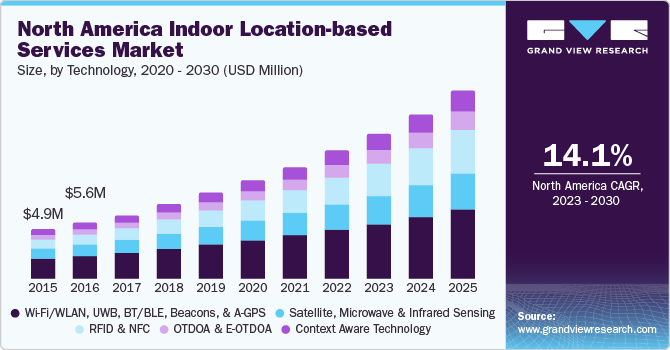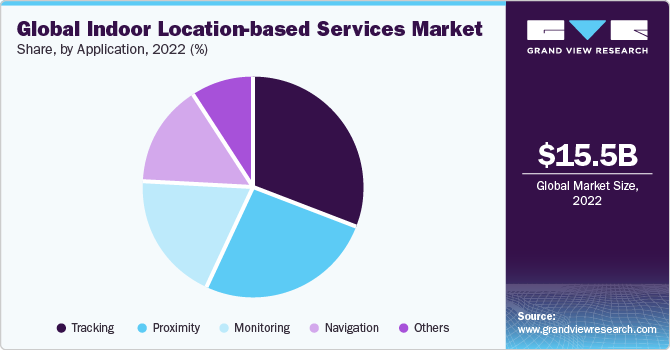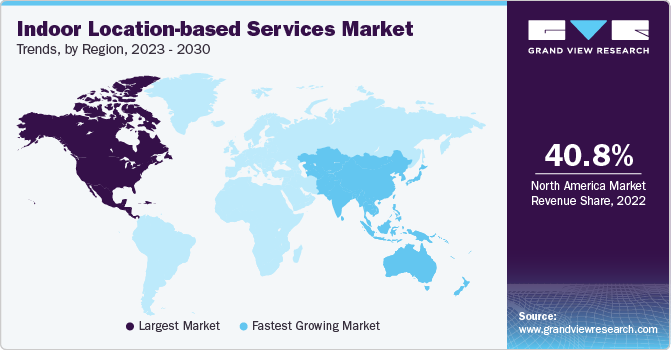- Home
- »
- Next Generation Technologies
- »
-
Indoor Location-based Services Market Size Report, 2030GVR Report cover
![Indoor Location-based Services Market Size, Share & Trends Report]()
Indoor Location-based Services Market (2023 - 2030) Size, Share & Trends Analysis Report By Product, By Technology, By Application (Monitoring, Tracking, Proximity, Navigation, Others), By End-use, By Region, And Segment Forecasts
- Report ID: GVR-2-68038-448-2
- Number of Report Pages: 190
- Format: PDF
- Historical Range: 2017 - 2021
- Forecast Period: 2023 - 2030
- Industry: Technology
- Report Summary
- Table of Contents
- Segmentation
- Methodology
- Download FREE Sample
-
Download Sample Report
Indoor Location-based Services Market Summary
The global indoor location-based services market size was valued at USD 15.48 billion in 2022 and is projected to reach USD 45.16 billion by 2030, growing at a CAGR of 14.1% from 2023 to 2030. Increasing penetration of connected devices, such as mobile phones and tablets, worldwide is expected to drive the market over the forecast period.
Key Market Trends & Insights
- North America dominated the market and accounted for the largest revenue share of 40.8% in 2022.
- Based on technology, the Wi-Fi/WLAN, BT/BLE, beacons, and A-GPS segment accounted for the largest revenue share of around 28.3% in 2022.
- Based on application, the tracking segment held the largest revenue share of 30.9% in 2022.
- Based on product, the location-based advertising services segment accounted for the largest revenue share of 15.0% in 2022.
- Based on end-use, retail segment held the largest revenue share of 23.3% in 2022.
Market Size & Forecast
- 2022 Market Size: USD 15.48 Billion
- 2030 Projected Market Size: USD 45.16 Billion
- CAGR (2023-2030): 14.1%
- North America: Largest market in 2022
- Asia Pacific: Fastest growing market
Furthermore, the rising use of location-based services (LBS) for promotional applications is anticipated to stimulate the market's growth over the coming years.Infrastructure developments such as retail malls, parks, educational institutes, and hospitals provide a lucrative scope for implementing location-based services (LBS) for navigation and tracking purposes. Moreover, increasing deployment of local and home area networks, such as Wi-Fi and WLAN, is projected to increase the indoor location-based services (LBS) market over the forecast period.
Advancements in infrastructure facilities such as shopping malls, skyscrapers, and hi-tech parks across various regions are leading to increased implementation of indoor LBS. Most educational institutes and business organizations worldwide are adopting virtual private networks (VPNs) for data protection, which enables them to adopt location-based services.
Indoor LBS is also used to provide assistance and security. Government authorities' spiraling use of monitoring devices to track public activities is also poised to stoke the market's growth. Apart from this, the growing implementation of location-based services in the retail sector for promotional purposes likely benefits the market's growth.
Technological advancements encourage industry players to use analytics and business intelligence to enhance location accuracy, thereby increasing tracking efficiency. However, the real-time accuracy of the information remains a challenge for industry participants.
Application Insights
The tracking segment held the largest revenue share of 30.9% in 2022. Monitoring and tracking assets are major uses of location-based services. The use of location-based services for tracking valuable and sensitive assets, such as information hardware in defense, is estimated to spur the segment's growth.

The proximity segment is expected to grow at the fastest CAGR of 17.2% over the forecast period. It enables companies to provide customers with product information based on location, promoting customer engagement. Using location-based services for geo-targeting is anticipated to trigger the market's growth.
Product Insights
The location-based advertising services segment accounted for the largest revenue share of 15.0% in 2022. Since several companies are using location-based applications to promote their products, the segment is estimated to witness significant growth over the forecast period. Promotional information, such as coupons and discounts, is offered through indoor LBS, which is expected to accelerate the segment's growth further.
The proximity beacons segment is expected to grow at the fastest CAGR of 17.9% during the forecast period. Proximity beacons are used for hyper-local advertising and other types of location-based promotion. These beacons are affordable and easy to install and hence, a preferred choice of marketers. Furthermore, advancements in technology enable proximity beacons to support Bluetooth and Wi-Fi connectivity, making them suitable for various purposes.
Regional Insights
North America dominated the market and accounted for the largest revenue share of 40.8% in 2022. The region is home to key industry players operating in the market that has pioneered the development of location-based service technologies for various applications. Moreover, these companies are very aggressive when it comes to service innovation, as a result of which, the application portfolio of indoor LBS continues to expand.

Asia Pacific is expected to grow at the fastest CAGR of 18.9% during the forecast period. The growing penetration of retail companies in the region to likely augment the regional market. Furthermore, the region's infrastructural development, such as commercial offices, townships, and shopping malls, offers lucrative opportunities to implement location-based services.
Technology Insights
The Wi-Fi/WLAN, BT/BLE, beacons, and A-GPS segment accounted for the largest revenue share of around 28.3% in 2022. Continued deployment of Wi-Fi networks for data security is projected to foster the segment's growth. Moreover, the availability of low-cost beacons and the rollout of ultra-wideband frequencies encourage companies to deploy LBS for marketing applications.
Soaring Wi-Fi/WLAN technology use in the telecom industry and the growing use of smartphones and internet services are poised to stoke market growth. Furthermore, shopping malls increasingly use Wi-Fi/WLAN technology to know consumer buying behavior for higher customer engagement and increased sales. Rising preference for wireless transactions and data transfers will likely fuel the demand for the Wi-Fi/WLAN, BT/BLE, Beacons, and A-GPS segment over the forecast period.
The NFC and RFID technology segment is estimated to register the fastest CAGR of 17.4% over the forecast period. It is vital in facilitating precise and real-time location tracking and identifying objects and individuals within indoor environments. The increasing demand for efficient asset tracking and management solutions drives the RFID and NFC technology market.
End-use Insights
The retail segment held the largest revenue share of 23.3% in 2022. Location-based services are largely used in the retail sector for purposes such as marketing and customer retention. These services use applications that can be installed on mobile phones and various other connected devices.
Depending on the location, a customer can receive information about restaurants, parks, institutions, and hospitals, among others as well as other data, such as ratings, reviews, and product descriptions. It allows retail companies to enhance the shopping experience of customers. Moreover, these services offer real-time advertisements to alert customers about offers and sales at various stores.
LBS allows retailers to get information about customers’ interests within the store and their purchase history, which allows them to assess customers’ needs and effectively provide them with immediate value. It is further projected to stir up the demand for indoor LBS in the retail segment.
The others segment is expected to grow at the fastest CAGR of 19.9% over the forecast period. It consists of education and manufacturing. The increasing emphasis on technology integration in educational institutions has created a demand for innovative solutions that enhance the learning experience. It allows educational institutions to deliver location-based services and personalized content to students and staff within campus premises.
Moreover, with the help of indoor positioning technologies, manufacturing facilities can track the movement of materials, components, and finished products within the facility, significantly reducing time wastage in searching for items and enhancing overall operational efficiency.
Key Companies & Market Share Insights
The market is highly competitive, and the players are undertaking strategies such as product launches, acquisitions, and collaborations to increase their global reach. For instance, in February 2023, Radisys, an American company specializing in open telecom solutions, launched Radisys ReachPoint. This pioneering intelligent network-oriented geolocation platform empowers mobile network operators to provide instantaneous geolocation services, even within regions with limited GPS connectivity. The ReachPoint Navigation application creates a digital blueprint of structures or areas, enabling users to pinpoint precise destinations through vocal prompts and optimal route suggestions.
Key Indoor Location-based Services Companies:
- Apple Inc.
- Cisco Systems, Inc.
- Glopos Technologies
- Google LLC
- HERE
- Inside Secure
- IndoorAtlas
- Microsoft
- Navizone Limited
- Qualcomm Technologies, Inc.
- CommScope, Inc.
- Shopkick, Inc.
- Invigor
- YOOSE Pte. Ltd
Recent Developments
-
In December 2022, Oriient New Media Ltd, a software-based IndoorGPS provider that utilizes Earth's magnetic field, launched its solution on the Google Cloud Marketplace. It enables customers with existing commitments on the platform to procure and receive consolidated billing through a single channel conveniently. The availability of Oriient's solution on the marketplace aims to assist retailers in enhancing the in-store shopping experience by incorporating additional digital touchpoints and leveraging customer journey analytics for operational improvements and increased profitability.
-
In September 2022, Inpixon, an indoor intelligence company, joined forces with Schauenburg Systems, an OEM specializing in mine safety systems and equipment. The collaboration aims to promote Inpixon's real-time location technologies to mining companies operating in South Africa. The agreement focuses on selling numerous nanoLOC chips and other core technologies from Inpixon that provide collision avoidance, offering real-time tracking and proximity applications for the mining industry.
-
In July 2022, Esri, a geographic information system company, launched ArcGIS IPS, an indoor positioning system designed for facility wayfinding. This innovative solution empowers organizations to incorporate indoor location services throughout their facilities and campuses. By utilizing ArcGIS IPS, maintenance workers can efficiently review service requests and promptly identify and navigate to specific locations inside buildings where repairs are required.
-
In January 2022, HERE, a location data and technology platform, launched Indoor Map as a service. This comprehensive solution for indoor mapping is made possible through a partnership with Navenio, a software company. By leveraging this technology, businesses can create high-definition, 3D indoor maps of their buildings, accurately representing real-world data.
Indoor Location-based Services Market Report Scope
Report Attribute
Details
Market size value in 2023
USD 17.99 billion
Revenue forecast in 2030
USD 45.16 billion
Growth rate
CAGR of 14.1% from 2023 to 2030
Base year for estimation
2022
Historical data
2017 - 2021
Forecast period
2023 - 2030
Report updated
October 2023
Quantitative units
Revenue in USD million/billion, and CAGR from 2023 to 2030
Report coverage
Revenue forecast, company ranking, competitive landscape, growth factors, and trends
Segments covered
Product, technology, application, end-use, region
Regional scope
North America; Europe; Asia Pacific; Latin America; MEA
Country scope
U.S.; Canada; UK; Germany; France; China; Japan; India; Australia; South Korea; Brazil; Mexico; Saudi Arabia; South Africa; UAE
Key companies profiled
Apple Inc.; Cisco Systems, Inc.; Glopos Technologies; Google LLC; HERE; Inside Secure; IndoorAtlas; Microsoft; Navizone Limited; Qualcomm Technologies, Inc.; CommScope, Inc.; Shopkick, Inc.; Invigor; YOOSE Pte. Ltd
Customization scope
Free report customization (equivalent up to 8 analyst’s working days) with purchase. Addition or alteration to country, regional & segment scope
Pricing and purchase options
Avail customized purchase options to meet your exact research needs. Explore purchase options
Global Indoor Location-based Services Market Report Segmentation
This report forecasts revenue growth at global, regional, and country levels and provides an analysis of the latest industry trends in each of the sub-segments from 2017 to 2030. For this study, Grand View Research has segmented the global indoor location-based services market report based on product, technology, application, end-use, and region:
-
Product Outlook (Revenue, USD Million, 2017 - 2030)
-
Analytics and Insights
-
Automotive Services
-
Campaign Management
-
Consumer Services
-
Enterprise Services
-
Location and Alerts
-
Location-based Advertising Services
-
Maps
-
Precision Geo-targeting
-
Proximity Beacons
-
Secure Transactions and Redemptions
-
-
Technology Outlook (Revenue, USD Million, 2017 - 2030)
-
Context Aware Technology
-
OTDOA and E-OTDOA
-
RFID and NFC
-
Satellite, Microwave and Infrared Sensing
-
Wi-Fi/WLAN, UWB, BT/BLE, Beacons, and A-GPS
-
-
Application Outlook (Revenue, USD Million, 2017 - 2030)
-
Monitoring
-
Navigation
-
Proximity
-
Tracking
-
Others
-
-
End-use Outlook (Revenue, USD Million, 2017 - 2030)
-
Aerospace and Defense
-
BFSI
-
IT and Telecommunication
-
Energy and Power
-
Government
-
Healthcare
-
Hospitality
-
Retail
-
Transportation & Logistics
-
Others
-
-
Regional Outlook (Revenue, USD Million, 2017 - 2030)
-
North America
-
U.S.
-
Canada
-
-
Europe
-
UK
-
Germany
-
France
-
-
Asia Pacific
-
China
-
Japan
-
India
-
Australia
-
South Korea
-
-
Latin America
-
Brazil
-
Mexico
-
-
Middle East and Africa
-
Saudi Arabia
-
South Africa
-
UAE
-
-
Frequently Asked Questions About This Report
b. The global indoor location-based services market size was valued at USD 15.48 billion in 2022 and is expected to reach USD 17.99 billion in 2023.
b. The global indoor location-based services market is expected to witness a compound annual growth rate of 14.1% from 2023 to 2030. to reach USD 45.16 billion by 2030.
b. North America dominated the indoor LBS market with a share of 40.8% in 2022. This is attributable to the presence of key industry players operating in the market that have pioneered the development of location-based service technologies for various applications.
b. Some key players operating in the indoor LBS market include Apple Inc.; Cisco Systems Inc.; GloPos Technologies; Google Inc.; HERE Holding Corporation; Inside Secure Corporation; IndoorAtlas Ltd; Microsoft Corporation; Navizon Inc.; Qualcomm Inc.; Shopkick, Inc.; CommScope, Inc.; YOOSE Pte. Ltd.; and Sprooki Pte Ltd.
b. Increasing penetration of connected devices, such as mobile phones and tablets, worldwide is expected to drive the market over the forecast period. Furthermore, the rising use of location-based services for promotional applications is anticipated to stimulate the market's growth over the coming years.
Share this report with your colleague or friend.
Need a Tailored Report?
Customize this report to your needs — add regions, segments, or data points, with 20% free customization.

ISO 9001:2015 & 27001:2022 Certified
We are GDPR and CCPA compliant! Your transaction & personal information is safe and secure. For more details, please read our privacy policy.
Trusted market insights - try a free sample
See how our reports are structured and why industry leaders rely on Grand View Research. Get a free sample or ask us to tailor this report to your needs.










